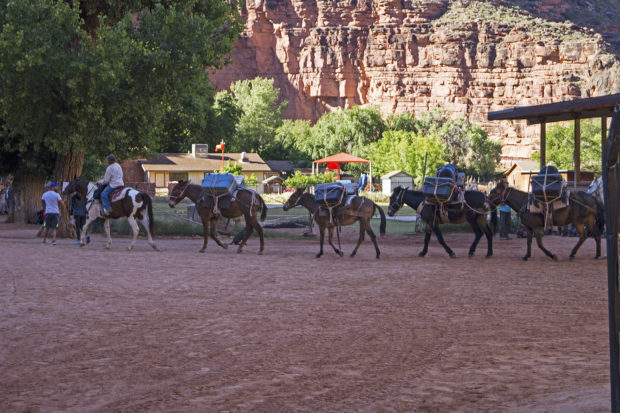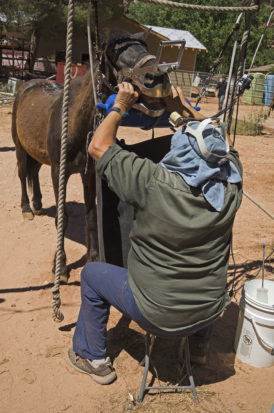
In the past year, the village of Supai in Arizona has drawn attention for the wrong reason: the abuse and neglect of horses used by villagers to carry visitors’ luggage and other goods. Photo by Carrie Allan/The HSUS
The Havasupai Reservation village of Supai, Arizona, located just outside the boundaries of Grand Canyon National Park but sharing the extraordinary beauty of the region, is in its own right a popular and scenic tourist destination. Its waterfalls and swimming opportunities draw tourists and motivate them to descend a lengthy and tortuous eight-mile trail to get to the scenic destination at the base of the canyon.
But in the past year, Supai has drawn attention for the wrong reason: the abuse and neglect of horses used by villagers to carry visitors’ luggage and other goods along the eight-mile hike from the canyon’s entrance to Supai. Earlier this month, Genesis Award-winning reporter George Knapp of KLAS-TV in Las Vegas — entirely independent of any work that The HSUS did — captured very disturbing mistreatment of working animals in a series of reports aired by the station. Knapp discovered burros and mules with open sores and broken bones being forced to carry more than 100 pounds of weight over the treacherous trails. Some horses went down and couldn’t get up, with some terrible outcomes for the horses.
This past weekend, the horses of Supai got some relief: 12 people, including representatives of Equine Voices Rescue & Sanctuary and Healing Hearts Animal Rescue, veterinarians, and equine hoof care specialists, under the leadership of HSUS Arizona state director Kellye Pinkleton, traveled there to provide veterinary medical treatment and education to the village’s horse owners, with the consent and cooperation of tribal leaders. There are approximately 175 horses at Supai, and more than 70 were vaccinated, dewormed, and given dental and hoof care. The team also provided treatment on-site at the homes of several Havasupai tribe members. Dogs in the village were vaccinated for rabies, and everything was done at no charge to the tribal members.
Dr. Richard Fisher of Fisher Equine Dentistry examines a horse in Supai. Photo by Carrie Allan/The HSUS
There is no veterinarian in the village, no feed store, and little access to supplies, and as a sovereign nation, they are not covered by current state animal cruelty laws. That’s precisely why our Kellye Pinkleton opened up discussions and met with tribal leaders in 2016, following up with a proposal to provide education, training, and resources to caregivers, and veterinary care for the horses. She’s taken a collaborative approach, and the results have been extraordinarily beneficial for the horses.
We coordinated our work in Supai this week with tribal animal control officers. The veterinarians and equine hoof care specialist provided on-site training and education to the animal control officers and horse owners, treated and vaccinated horses, trimmed and shod hooves, and performed dental treatments, including extractions. The group also delivered equine food, pellets, salt blocks, bales of hay, and donated farrier tools and other supplies to the tribe.
The tribe surrendered five puppies, who went to the Coconino Humane Association in Flagstaff. A blind horse was transported to Equine Voices Rescue & Sanctuary located in Green Valley, where he will receive lifetime care and a loving home, with financial help from The HSUS. We are most grateful for the cooperation of the tribe.
The HSUS has always maintained, as evidenced by The Humane Society Veterinary Medical Association’s Rural Area Veterinarians (RAVS) program, that any work done on tribal lands must be in partnership with the tribe and its leaders to ensure sustained, effective outcomes. Tribal lands are governed as sovereign nations and we believe cooperative efforts yield lasting positive results and allow for trust and opportunities to create additional ways to support the animals in tribal communities.
This effort embodied that spirit of cooperation and, Kellye said, the tribal leaders were pleased with the service and care provided by the team to their horses. “We are encouraged by conversations with the tribal council members about our visit and look forward to continuing our discussions about future trips and exploring additional ways to partner,” she added.
The post Finding a common trail to help working horses on tribal lands in Arizona appeared first on A Humane Nation.
Enviroshop is maintained by dedicated NetSys Interactive Inc. owners & employees who generously contribute their time to maintenance & editing, web design, custom programming, & website hosting for Enviroshop.

